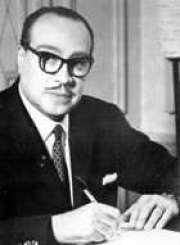|
Biografie Jorge Carrera Andrade
Născut la Quito (Ecuador), la 4 septembrie 1902. Carieră diplomatică, reprezentant al țării sale în Japonia, Franța, Spania, S.U.A., Venezuela și Marea Britanie.
Selecție din operele publicate:
* El estanque inefable (Bazinul inefabil), 1922
* La guirlanda del silencio (Ghirlanda tăcerii), 1926
* Boletines de mar y tierra (Știri despre mare și pământ), 1930
* El tiempo manual (Timpul manual), 1935
* Biografia para uso de los pajaros (Biografie pentru uzul păsărilor), 1937
* Pais secreto (Țara secretă), 1940
* Hombre planetario (Omul planetar), 1959
* Poesia ultima, 1968
Jorge Carrera Andrade was an Ecuadorian poet, historian, author, and diplomat during the 20th century. He was born in Quito, Ecuador in 1902. He died in 1978.
From 1928-33 Carrera first experienced traveling in Europe. He served as Ecuadorian Consul in Peru, France, Japan and the United States. Later he became Ambassador to Venezuela, the United Kingdom, Nicaragua, France, Belgium, and the Netherlands. He also served as Secretary of State of Ecuador.
While living in the United States, Carrera developed many literary relationships with American writers, in particular Muna Lee whose critically-acclaimed translation of his poetry, Secret Country, was published in 1946. His work was praised and championed by John Malcolm Brinnin, H.R. Hays, Archibald MacLeish, Carl Sandburg, William Jay Smith and William Carlos Williams. Carrera Andrade's poetic work developed for half a century in a number of volumes published worldwide.
In 1972 Obra poetica completa, which gathers the totality of his lyric work, appeared in Quito. Most of his poetry has been translated into French, English, Italian and German. He also published books of essays, history and an autobiography, El volcan y el colibri (The Volcano and the Hummingbird).
After Carrera's diplomatic career ended in 1969, he was appointed Distinguished Visiting Professor at SUNY Stony Brook, Long Island, where he lectured for two academic years. He spent his last years in his native city of Quito, as Director of the National Library of Ecuador. During his life and after his death he has been recognized with Borges, Neruda, Paz and Vallejo as one of the most important Latin American poets of the twentieth century.
|





